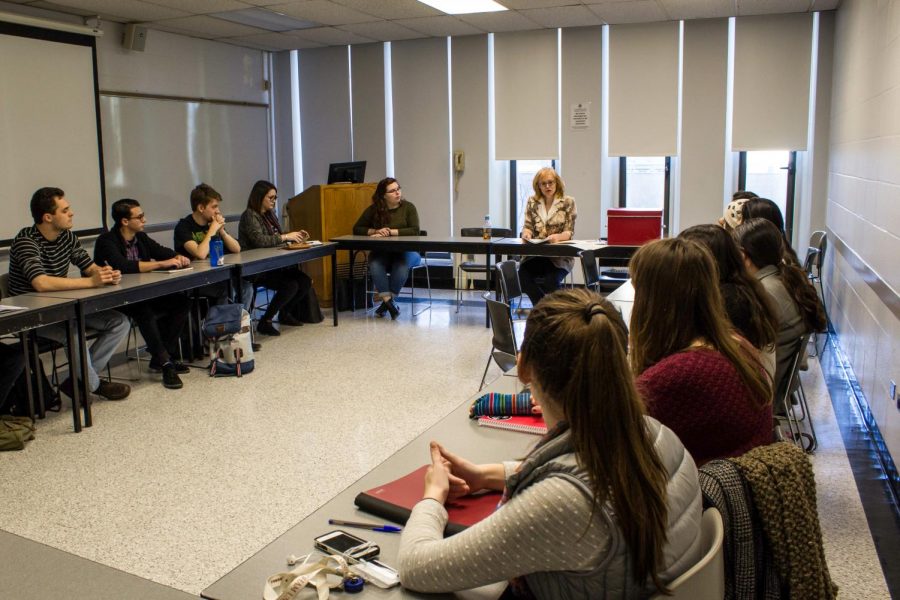Creative Writing: Competitive, Yet Communal
Ahead of the Creative Writing Prizes, English department chair Mary Bly talks about the ‘energetic’ program
The English department’s Creative Writing program promotes collaboration and self-expression.
February 19, 2020
Maya Angelou once said, “There is no greater agony than bearing an untold story inside of you.” You’ve probably heard this inspirational quote at some point from your English professor or one of Fordham’s many aspiring student authors, poets, playwrights or screenwriters.
Fordham’s Creative Writing program, at both the Lincoln Center and Rose Hill campuses, has always stressed the importance of a quote like this. Whether a student wishes to write fiction, nonfiction, something fantastical or something personal, Mary Bly, Shakespeare professor and Chair of the English Department, believes the program measures success by collaboration and self-expression rather than just academic prowess.
“Creative writing students tend to be very energetic and community-driven,” Bly said. “There are a whole bunch of little initiatives that students create for themselves and that I have nothing to do with. They often form like a little ‘salon’ (outside of class) so that they could meet and exchange work with each other. And I just let them go for it.
“I’m extremely interested in helping our students create a guided pathway through Fordham so that it never really feels like a transactional experience. It is really much more about finding yourself, creating community and becoming reflective of your identity by the time you graduate and eventually apply for a job.”
Through Feb. 15, the program’s annual Creative Writing Prizes have also given students the opportunity to be publicly recognized and rewarded for storytelling capabilities. The prizes themselves include the Academy of American Poets Prize, the Bernice Kilduff White and John J. White Creative Writing Prize (only eligible for Rose Hill senior undergraduates), the Margaret Lamb/Writing to the Right-Hand Margin Prize, and the Reid Family Prize. However, even Bly said that while the creative writing community as a whole is anything but ruthless, the same cannot be said for the Prizes competition.
“There is a limit on what we can do and who we can accept,” Bly said. “With the amount of applicants we receive every year, there is definitely a difference of expertise among each of the submissions we review. And the same also applies for the program’s admission process.
“I think that over the years, the quality is getting higher and higher, and the number of people that say they are applying simply because of our program’s reputation has also been growing as well. You have students that have been highly trained and are highly talented, each of them saying, ‘I want to be in Creative Writing.’ And I always respond with, ‘Yes! Definitely come!’ But I’m also thinking to myself, ‘Please! I really hope you get in!’”
However, even something as simple as writing about one’s interests when it comes to literature or certain genres of literature, according to Bly, is enough to potentially be considered for the program. She said the passion for that genre of literature still needs to be evident.
“The main thing that I tend to focus on when I look at these submissions is the commitment to craft. An applicant can write, ‘I love books. I have always loved books. I have loved books since I was four years old,’ but you have to remember that this is about you as a talented writer,” Bly said. “And applicants who choose to write that type of material might actually be incredibly talented, but they are so retiring in their submissions that we never know it.
“We want to know what you really like to write. ‘I like to write horror.’ Okay, but why? I do remember this one letter that said, ‘I like to write horror and I’m particularly inspired by Dante’s Inferno.’ That’s a slam-dunk right there.”
In many respects, Bly’s belief that students should write about whatever interests them echoes one of Virginia Woolf’s most influential excerpts from her acclaimed feminist essay, “A Room of One’s Own” — “So long as you write what you wish to write, that is all that matters; and whether it matters for ages or only for hours, nobody can say.”
In other words, they both believe in writing about what you love, what you enjoy or what speaks to you the most. In Fordham’s Creative Writing program, students serve as the foundation, not their GPA.











Ferdinard Orumgbe • Nov 24, 2020 at 11:50 am
I’m amazed by your shared post and I will be glad to get more of such posts. There are much more I’ve compiled about some other informative posts on my blog, so kindly visit via the link below:
https://www.tecreals.com/mobiletvshows/
fejiro • Aug 15, 2020 at 11:16 am
literature is an amazing subject. the genres of literature make it easier for students to understand its concept. I have always wanted to be a writer ever since I was introduced to the genre of literature. the way each genre is presented in their own unique way makes it an enjoyable subject to me. the prose genre interests me, even more, to want to write every story that comes to mind. If you are looking for an amazing site to get more information, then I have what you need. This link would grant you access to interesting articles that would be very useful and informative to you, and I would appreciate it if you visit my site. Many thanks.